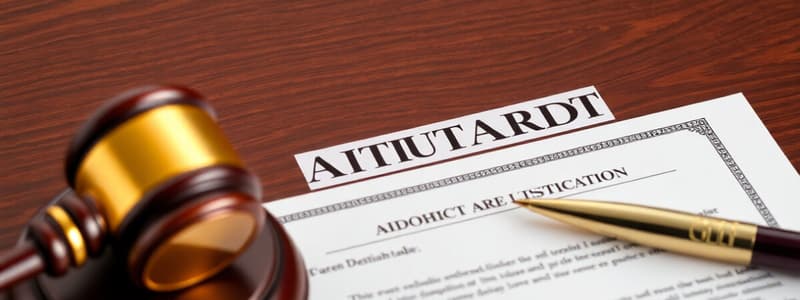Podcast
Questions and Answers
A notary public has known a signer for many years. Can the notary notarize the document based solely on this personal knowledge?
A notary public has known a signer for many years. Can the notary notarize the document based solely on this personal knowledge?
- No, satisfactory evidence of the signer’s identity must be provided regardless of personal knowledge. (correct)
- No, unless the signer takes an oath in the notary’s presence.
- Yes, because the notary has known the signer for a significant period.
- Yes, but only if the document is an acknowledgment.
What is the key difference in signer requirements between preparing a jurat versus a certificate of acknowledgment?
What is the key difference in signer requirements between preparing a jurat versus a certificate of acknowledgment?
- For a jurat, the signer must take an oath and sign the document in the notary's presence; for acknowledgment, the document can be signed beforehand. (correct)
- For an acknowledgment, a witness must be present.
- For a jurat, the notary does not need to verify the identity of the signer.
- For an acknowledgment, the signer must provide additional forms of identification.
In which scenario is it acceptable for a document to be signed before the signer appears before the notary public?
In which scenario is it acceptable for a document to be signed before the signer appears before the notary public?
- When the document requires an acknowledgment certificate. (correct)
- When the notary has known the signer for at least 5 years.
- When the signer is signing on behalf of a corporation.
- When the document requires a jurat.
What must a notary public certify when preparing both a jurat and an acknowledgment?
What must a notary public certify when preparing both a jurat and an acknowledgment?
A person requesting a jurat brings a pre-signed document to a notary. What should the notary do?
A person requesting a jurat brings a pre-signed document to a notary. What should the notary do?
A notary public is asked to notarize a document but is unsure if the signer fully understands its contents. Which of the following actions is most appropriate?
A notary public is asked to notarize a document but is unsure if the signer fully understands its contents. Which of the following actions is most appropriate?
If a signer acknowledges that they executed a document, but not in the notary's presence, which type of notarization is being performed?
If a signer acknowledges that they executed a document, but not in the notary's presence, which type of notarization is being performed?
What constitutes 'satisfactory evidence' of a signer’s identity, as required for notarization?
What constitutes 'satisfactory evidence' of a signer’s identity, as required for notarization?
A notary is presented with an unsigned document and asked to perform a jurat. What must occur?
A notary is presented with an unsigned document and asked to perform a jurat. What must occur?
Which of the following best describes the core duty of a notary public?
Which of the following best describes the core duty of a notary public?
Flashcards
Personal knowledge enough to notarize?
Personal knowledge enough to notarize?
No, personal knowledge alone is not sufficient. Satisfactory evidence of identity is required and must be noted in the journal.
Sign in notary's presence?
Sign in notary's presence?
For a jurat, yes. For an acknowledgment, no; the signer must acknowledge they executed the document.
Jurat requirements
Jurat requirements
The person requesting the notarization must appear before you, take an oath, and sign the document in your presence.
Acknowledgment requirements
Acknowledgment requirements
Signup and view all the flashcards
Identity verification requirement
Identity verification requirement
Signup and view all the flashcards
Study Notes
- An acknowledgment cannot be taken or a jurat executed based on personal knowledge alone
- Satisfactory evidence of the signer’s identity must be provided and noted in the journal for notarizations
Notarization Requirements
- For a jurat, the person requesting it must appear before you, take an oath, and sign the document in your presence
- For a certificate of acknowledgment, the document can be signed before the person brings it to you for notarization
- In an acknowledgment, the signer must personally appear before you and acknowledge that they executed the document
- The signer does not need to execute the document in the presence of the notary for an acknowledgement
- For both a jurat and an acknowledgment, the notary public must certify the identity of the signer
Studying That Suits You
Use AI to generate personalized quizzes and flashcards to suit your learning preferences.




